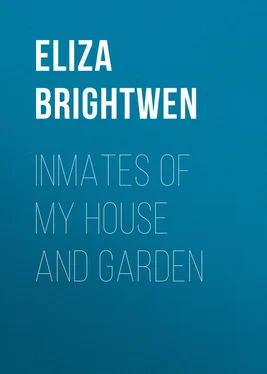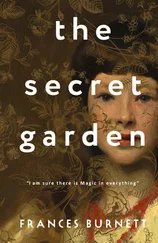Eliza Brightwen - Inmates of my House and Garden
Здесь есть возможность читать онлайн «Eliza Brightwen - Inmates of my House and Garden» — ознакомительный отрывок электронной книги совершенно бесплатно, а после прочтения отрывка купить полную версию. В некоторых случаях можно слушать аудио, скачать через торрент в формате fb2 и присутствует краткое содержание. Жанр: foreign_antique, foreign_prose, на английском языке. Описание произведения, (предисловие) а так же отзывы посетителей доступны на портале библиотеки ЛибКат.
- Название:Inmates of my House and Garden
- Автор:
- Жанр:
- Год:неизвестен
- ISBN:нет данных
- Рейтинг книги:3 / 5. Голосов: 1
-
Избранное:Добавить в избранное
- Отзывы:
-
Ваша оценка:
- 60
- 1
- 2
- 3
- 4
- 5
Inmates of my House and Garden: краткое содержание, описание и аннотация
Предлагаем к чтению аннотацию, описание, краткое содержание или предисловие (зависит от того, что написал сам автор книги «Inmates of my House and Garden»). Если вы не нашли необходимую информацию о книге — напишите в комментариях, мы постараемся отыскать её.
Inmates of my House and Garden — читать онлайн ознакомительный отрывок
Ниже представлен текст книги, разбитый по страницам. Система сохранения места последней прочитанной страницы, позволяет с удобством читать онлайн бесплатно книгу «Inmates of my House and Garden», без необходимости каждый раз заново искать на чём Вы остановились. Поставьте закладку, и сможете в любой момент перейти на страницу, на которой закончили чтение.
Интервал:
Закладка:
All this is wonderfully human, and all to be found in a creature not two inches in length! If Fairy could be seen minus her feathers she would be about the size of a walnut! I do think in all respects a bird is one of the principal marvels of creation, most lovely and lovable. See the little creature taking a bath, reducing itself to a disreputable tuft of draggled feathers for the sake of cleanliness, and then fluttering and shaking itself dry again, and by means of its wonderful beak pluming its feathers into order, applying oil to them from its little gland just above the tail, and after infinite pains ending by looking soft and sleek as a piece of satin.
Instinct teaches it to do all this which we could no more imitate than we could fly. Then how touching is the motherhood of a bird. Many a human mother is put to shame by the example of a little feathered thing which has only instinct to guide her in preparing her soft, warm nursery, to which love ties her closely for two or three weeks. Bright days come and go, but she denies herself all the pleasures she sees other birds enjoying, and barely takes time to get her needful food, that she may keep warm those two little snowy eggs which are all the world to her even now, and when young creatures begin to stir beneath her faithful breast then she exchanges the quiescent life for one of incessant toil that her callow brood may not call to her in vain for the insect diet which she has to provide.
By the time the young ones can feed themselves the parents are quite thin and worn with their incessant toil, and yet in favourable seasons some kinds of birds rear a second or even a third family before the summer is over.
Although the Whitethroat is plentiful in the southern counties, I do not find that people, as a rule, are at all familiar with its appearance, and I imagine this arises from the shy habits of the bird. It flits nimbly out of sight when alarmed, and being of an inconspicuous grey colour, it requires a keen eye to distinguish it when hopping noiselessly about in weedy hedgerows, where it is so often found that it has obtained the provincial name of Nettle Creeper.
With reference to the migration of the Whitethroat, I learn from one of Canon Tristram’s delightful books on birds, that Algeria is its winter retreat. He says: —
“Each portion of the Sahara – the rocky ridges, the sand drifts, the plains – has its peculiar ornithological characteristics. But by far the most interesting localities are, as might have been anticipated, the dayats and the oases. Here are the winter quarters of many of our familiar summer visitants. The chiff-chaff, willow-wren, and whitethroat hop on every twig in the gardens shadowed by the never-failing palm; the swallow and the window martin thread the lanes and sport over the mouths of the wells in pursuit of the swarming mosquitoes.”
When spring returns, these smaller birds are led by instinct to re-cross the Mediterranean and seek their European haunts where the temperature has again become sufficiently mild to enable them to find insect food and rear their families of nestlings.
The sharp clicking note, like two stones jarred together, which this bird makes when excited, we constantly hear in our furze-bushes and hedges, proving that the whitethroat exists in some numbers in Middlesex; and now that my “Fairy” has begun to sing, I find it is a strain with which I am quite familiar. My curiosity had often been excited by hearing low, soft warbles from unseen singers on the common or in the woods; I vainly tried to see what bird it could be, but it always seemed to remain out of sight. My small pet has solved the mystery by performing for my private benefit the sweet music of her wild brethren out of doors.
I am constantly reminded of the lines in Coleridge’s “Ancient Mariner”: —
“A noise like of a hidden brook
In the leafy month of June,
That to the sleeping woods all night
Singeth a quiet tune.”
As I sit at my writing, the delicate soft warbling goes on hour after hour, and is a source of real pleasure to me, so manifestly is it the outcome of a perfectly happy little spirit telling out its inward joy in its own sweet fashion.
Captivity has no terrors for Fairy; she loves her cage, and will hardly leave it except when she occasionally takes a swift flight to and fro, and then alights on my notepaper to give a peck at my pen. She delights in sitting on the fender, fluffing up her feathers to revel in the warmth, which, in winter, is her substitute for sunshine, and before long she returns to her own little home, where she may be seen gracefully sipping the sweet juice of a grape before recommencing her song.
I often wonder how long this, my latest pet, may be spared to me! A bird’s life is such a tender thing – a moment’s carelessness may rob one of a cherished pet, and the greatest care will not always guard such a tiny swift-flying bird from injury.
May the sorrowful day be far distant that shall see me bereft of my little ray of home sunshine, my Fairy Whitethroat!
ASNAPPER
“Heard ye the Owl
Hoot to her mate responsive? 'Twas not she
Whom, floating on white pinions near his barn,
The farmer views well-pleased, and bids his boy
Forbear her nest; but she who, cloth’d in robe
Of unobtrusive brown, regardless flies
Mouse-haunted corn-stacks and the thresher’s floor,
And prowls for plunder in the lonely wood.”
WHILST enjoying the fresh beauty of my garden in the month of May, with its wealth of flowers and rich variety of leafage, my eyes happened to light upon a greyish tuft of feathers in a rhododendron bush. Curiosity led me to examine this tuft more closely, when, to my surprise, I found it was a young brown owl – alive, but in a very exhausted condition. It appeared to be only a few weeks old, fully feathered, but unable to feed itself; I suppose it had fallen out of the nest and was dying for lack of food. I need hardly say I carried it indoors, and did my best to feed and restore the poor orphan, and right well did he second my efforts. A juicy uncooked mutton chop was cut up and mixed with feathers, and with resounding snaps of his great beak the morsels were received and swallowed. A second chop was disposed of before my friend seemed satisfied, and with such a mighty appetite I felt there would be no difficulty in rearing this vigorous infant. Next morning I found two sparrows and a mouse had been obtained. These soon disappeared, and had to be supplemented by a piece of raw meat. And if this is the daily diet of a very young owl, we may form some idea of the way in which full-grown birds must reduce the hordes of mice and rats which would otherwise overrun the country.
Whenever we passed the owl’s cage he gave a resounding snap with his beak, not viciously but as a friendly recognition, and somehow this habit suggested the name of the Assyrian king, the “noble Asnapper,” and this, familiarly contracted to “Snap” for every-day use, became the recognised title of our new pet.
Asnapper lived quietly enough during the day in a large cage well covered from the light, but towards evening, when he had enjoyed his second repast of raw meat, he began to wake up and long for exercise. He was allowed his liberty in the house, and made full use of this privilege by going about from room to room, either running along the floor like a grey rabbit, or taking short flights with his noiseless wings. He would gravely pursue his way up the stairs a step at a time, and seemed to enjoy watching cattle in the fields whilst sitting motionless on a window-sill.
Until the bird could feed himself it would have been no kindness to let him go out of doors and starve, so I resolved to make the creature’s life as happy as possible, whilst I had thus a good opportunity of learning the habits of an interesting species of bird. I could not help being somewhat afraid of his formidable curved beak, which looked as if it could inflict a severe wound, but I soon learned how gently Asnapper could use it; he would play with my fingers and hold them with such care that we had merry games of play at evening recreation time, when he looked to be let out of his cage and go where he pleased for an hour or two.
Читать дальшеИнтервал:
Закладка:
Похожие книги на «Inmates of my House and Garden»
Представляем Вашему вниманию похожие книги на «Inmates of my House and Garden» списком для выбора. Мы отобрали схожую по названию и смыслу литературу в надежде предоставить читателям больше вариантов отыскать новые, интересные, ещё непрочитанные произведения.
Обсуждение, отзывы о книге «Inmates of my House and Garden» и просто собственные мнения читателей. Оставьте ваши комментарии, напишите, что Вы думаете о произведении, его смысле или главных героях. Укажите что конкретно понравилось, а что нет, и почему Вы так считаете.












